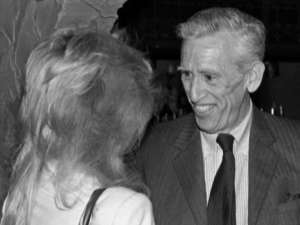Catching up with Canadian politics .. and the death of Holden Caulfield’s dad
Feb 1st, 2010 | By Citizen X | Category: In Brief
According to the latest polls the Harper Conservatives are losing ground in Canada’s most populous province. And they aren’t likely to make much of it up by the appointment of old eastern Ontario provincial Tory Bob “Mad Dog” Runciman to the unreformed Senate of Canada.
You of course hear nothing about Canadian politics via the ordinary media in Florida, where I spent the counterweights late January prorogue. And I didn’t take a laptop computer with me. On the theory that a week is a long time in politics, one of my first tasks on returning to the northern deep freeze was to catch up on the Ottawa scene.
To start with, two opinion polls from last Thursday suggest a week may not always be all that long in politics. With a Canada-wide sample of “1,005 adults,” January 25—26, Angus Reid reported Conservatives 33%, Liberals 29%, New Democrats 19%, Bloc Quebecois 10%, Green Party 7% – all under the headline “With Parliament Prorogued, Liberals Get Closer to Conservatives.” More provocatively, with a Canada-wide sample of “3,206 Canadians aged 18 and over,” January 20—26, EKOS reported Liberals 31.6%, Conservatives 31.1%, New Democrats 14.6%, Green Party 11.0%, Bloc Quebecois 9.1%, and Other 2.6%. Plugging these numbers into its parliamentary seat-projection model, the same poll had the “Liberals winning 119 [seats] compared to 110 for the Tories if an election were held today. The NDP would win 30 seats, the Bloc could garner 46 and Elizabeth May’s Green Party would win one seat – in Ontario – with two more going to ‘other’ parties or independents.” [UPDATE: A new Harris-Decima poll released today, with a sample of 2,000, January 21-31, tends to confirm the trend here: It “suggests a dead heat between the two parties, at 32 per cent each. The NDP was at 15 per cent, the Bloc Quebecois at 10, and the Greens at nine.”]
Last Thursday as well minority Prime Minister Harper finally got around to making the five new Senate appointments he once said he would never make – to put the Conservatives ahead of the Liberals in that “relic of the 19th century” (another memorable early Harperism) that remains the unreformed Senate of Canada. Three of the five were outright Conservative provincial politicians (Elizabeth Marshall from the Rock, Rose-May Poirier from New Brunswick, and Bob Runciman from Ontario). Two others had some pretence of more high-minded motivations: Vim Kochhar, who was born in India and became a Canadian citizen in 1974, and has founded both the Vimal Group of Companies in Toronto and the Canadian Foundation for Physically Disabled Persons; and Pierre-Hugues Boisvenu, a former Quebec public servant who founded the Murdered or Missing Persons’ Families Association, after his daughter was murdered in 2002.
Three recent columns by Chantal Hébert have also caught my eye: “Cash, votes and toxic politics”; “That political wake-up call? Quebec is sleeping through it”; and “After 7 years, power still eludes Jack Layton.” The last of these (published just today in fact) ends with a proposition I profoundly agree with myself: “Over the weekend, the NDP’s national council met to discuss what was billed as a strategy to win the next campaign. But despite those brave words, Layton’s best hope to continue to move his party closer to power is infinitely more likely to lie in a more constructive parliamentary relationship with the Liberals than in the ballot box.”
I was equally impressed by a column this past Saturday by Ralph Surette in the Halifax Chronicle Herald (and not really at all because my fellow Florida vacationers last week included some Haligonians). This piece was entitled “Democracy under assault: time to wake up.” And here is just a taste: “In Canada, Stephen Harper unilaterally shuts down Parliament with an astounding rationale: Parliament is just a bother, an impediment to doing real work, and people don’t care if it’s shut down …Â In the US, the picture is even more mind-boggling. Despite the unprecedented havoc wreaked by the Bush-Cheney Republicans – two lost wars, a near-depression, unprecedented deficits, the constitution and due process grievously undermined, the hurricane Katrina bungle, America’s reputation as a world leader and the ultimate can-do nation badly bruised – and despite being decisively routed in the last presidential election, the dregs of this party are still having their way.”
Finally, last Wednesday the American writer J.D. Salinger died at his home in Cornish, New Hampshire, at the venerable age of 91. And this I certainly did hear about even via the ordinary media in Florida.

J.D. Salinger, 63, with actress Elaine Joyce at the Alhambra Dinner Theater in Jacksonville, Florida, 1982. This was their first in-person meeting after a “romance via telephone and mail.” Ms. Joyce discovered: “He wasn’t a very nice man.” GENE SWEENEY JR./The Times-Union.
I was one of the millions upon millions who were (and apparently still are) enormously impressed in high school by the sad-rebel legend of Holden Caulfield, in Salinger’s 1951 novel The Catcher in the Rye. I went on to try to read other Salinger books: Franny and Zooey; Raise High the Roof Beam, Carpenters and Seymour: An Introduction; and Nine Stories.  But they just seemed depressing to me – as opposed to the strange combination of depressing and energizing that marks the Caulfield adventures. The teenage Caulfield might have become politicized in his young adulthood, and many of those who were inspired by him did in the 1960s. The characters in the other books were too self-obsessed to reach out to the larger community. In 1953, in the wake of the sudden great success of Catcher in the Rye, Salinger himself retreated to his splendid isolation in New Hampshire. He published nothing after 1965 (although there are now fresh rumours of manuscripts waiting to be found).
Yet, whatever else, Salinger showed that he really did know something about something by living into his early 90s (unlike, say, Hemingway or Fitzgerald). And even many who don’t like his other books still think that Holden Caulfied remains one of the great creations of American literature. J.D. Salinger was his literary father, and like millions upon millions again, I was suitably sad to hear of his passing last week.
